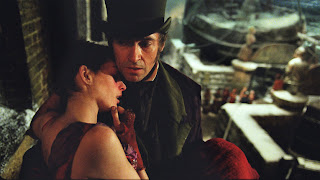Les Miserables Review
A sprawling spectacle with intermittent stumbles
Full, spoiler-free review by Isaac HandelmanNo matter your opinion on the film as a whole, it’s easy to get caught up in the sheer spectacle of Les Miserables. Spanning almost two decades and multiple cities and sporting a branching narrative that tells the tales of numerous protagonists, the film’s scope is admirable. Les Mis makes makes a few missteps while accomplishing the daunting task laid out before it, but it’s ultimately a memorable, one-of-a-kind cinematic experience.
For those who don’t already know, Les Mis is set in post-revolutionary France, and the anchor of the tale is Jean Valjean (Hugh Jackman), who, prior to the film’s opening, served a nineteen-year prison sentence as punishment for stealing a loaf of bread for his sister’s starving child. Not long into the proceedings, Valjean is released and put on a strict parole, which he promptly breaks in favor of living out his life under a pseudonym while under constant, unrelenting pursuit from police inspector Javert (Russell Crowe). Soon, Valjean becomes indebted to a woman named Fantine (Anne Hathaway), whose tragic predicament lays the groundwork for the film’s narrative.
The film finds itself split into two distinct halves, the first of which follows Valjean as he adopts and cares for Fantine’s child, Cosette (Isabelle Allen and later Amanda Seyfried) while evading Javert’s attempts to capture him. This first segment works wonderfully and rarely encounters a hiccup. In fact, the best bits of the film are embodied by the intriguing dynamic between Valjean and Javert, with the former performing all sorts of last-minute, city-trotting escapes in the film’s first half. Not long into the film, Hathaway brings everything around her to a screeching halt with her show-stopping solo rendition of “I Dreamed a Dream” (which in and of itself justifies her Oscar win). In fact, Hathaway’s performance dwarfs everything to come in the film’s remaining two hours -- which leads the remainder of the tunes to feel a bit underwhelming even though they are, for the most part, excellent.
Unfortunately, Les Mis suffers from a serious loss of momentum entering its second half. Around the midway point, the audience is introduced to a band of revolutionaries led by Marius (Eddie Redmayne). At this point, the narrative splinters in two, with the central draw being the tale of Revolution and Valjean’s struggles left on the sidelines until the finale. This isn’t a huge problem by itself, because the revolution storyline is interesting enough, though not as compelling as that of Valjean, Cosette and Javert. What’s more disappointing is the film’s sudden reliance on the painfully cliched love triangle. Les Mis hits a brick wall and stays grounded for about thirty minutes in its middle portion when it takes a break from everything that’s interesting to let a few of its characters belt out overly-extended solo pieces about how much they love each other. Next to Hathaway’s heart-wrenching solo outing, these songs feel arbitrary and almost immature, especially considering Les Mis is far from sugarcoated, sporting no shortage of violence and dark themes.
While I’m on the subject, perhaps it would be beneficial to get out of the way everything Les Mis does wrong. For one, Tom Hooper seems a strange choice to direct, as his signature style and shots make their way into the film resulting in the occasional feeling that Hooper shot portions of Les Mis without taking into account that it is is musical. As result, some shots feel hastily chopped together and a few odd shaky-camera moments present themselves. In conjuction, periodical moments feel too rushed as the film bustles from one location or plot thread to another without much in the way of closure. Hooper’s inexperience with musicals rears its head in the presentation of certain songs, which feel as if they’re thrown in simply to close up a loose plot thread rather than to add to the emotional poignance or drama of a scene (this problem pops up multiple times for Marius). And lastly, Cosette’s character isn’t fleshed out to the extent I would have liked; her character is only endeared to the audience in the sense that she’s acquainted with our main protagonist and never conveys her own personality to a satisfying extent.
It’s difficult not to be enamored by Les Mis’ stunning production design, and it’s hard to comprehend that almost every setting in the film was constructed as a set. In this sense, Les Mis retains certain elements of a stage production whilst managing to still feel like a film, as nowhere near the amount of detail on display here would be possible in a theatre.
And alongside Anne Hathaway’s Oscar-winning role, Les Mis is chock full of fine performances. Hugh Jackman is fantastic, Eddie Redmayne and Amanda Seyfried make for a convincing pair, and Russell Crowe, despite all the flack he’s received for his pitchy singing, is solid despite hitting some flat notes.
So what does all of that add up to? Well, I have numerous problems with Les Miserables, and yet the experience is one I would recommend to anyone. It’s difficult for me to articulate exactly why this is in words -- despite all of its issues, Les Mis is a bold, visual and auditory spectacle that’s emotionally affecting and enormously memorable. When it cuts to black at the end, I let out a deep breath and took a while to simply think about everything I’d just seen. The film leaves an impression -- that’s no simple feat.
Final Score:
7.5/10
“Very Good”





Your evaluation of Les Mis is exactly how I felt. Anne Hathaway had a very small part for the hype there was about her in it.
ReplyDeleteIt was a horrible period of French history. I had a hard time accepting it as entertainment. You are right, it is a musical, but I am afraid in play form it comes across better. They did a wonderful job and there are millions of people who worship Les Mis and they will only be happy that it was made into a movies with a wonderful talented cast.
Thanks for the great review! You should be published!
Uncle Don Iverson
Thanks for taking to time to read and give me feedback! I appreciate it.
Delete